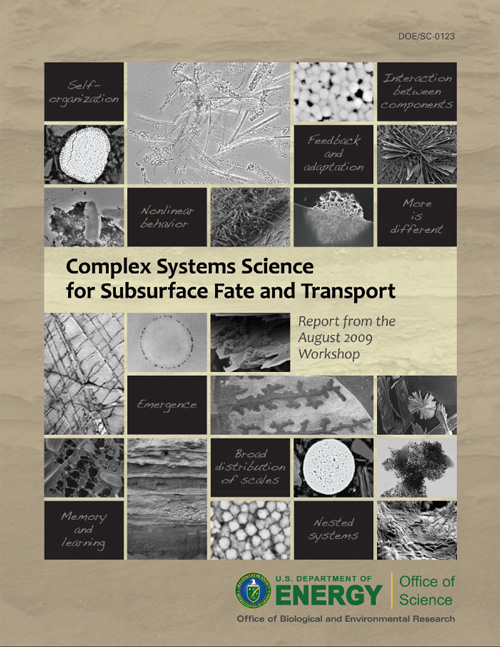Complex Systems Science for Subsurface Fate and Transport Workshop Report
- Print Publication: March 2010
- Workshop Dates: August 3-5, 2009
- Report Download: Fast-download PDF
- Report Download: Print-quality PDF
In August 2009, BER held the Subsurface Complex System Science Relevant to Contaminant Fate and Transport workshop to assess the merits and limitations of complex systems science approaches to subsurface systems controlled by coupled hydrological, microbiological, and geochemical processes. Important objectives were to
- Define complex subsurface systems, identify their distinguishing features, and establish why they are important to different DOE mission outcomes.
- Consider how the coupling of subsurface hydrological, microbiological, and geochemical processes defines complex system response and dynamics, and identify research challenges that, if resolved, would lead to high-impact subsurface science advances.
- Evaluate the need for new research approaches that identify and account for the influence of smaller-scale processes and their mechanisms on larger-scale system behavior.
- Conceptualize models and associated knowledge needed to describe and predict complex system behavior at different scales.
- Identify significant, long-term, interdisciplinary research opportunities associated with complex subsurface systems.
The workshop was attended by participants from universities and DOE national laboratories with broad expertise in the environmental, microbiological, Earth, and marine sciences. These researchers represented different perspectives spanning mechanistic investigations at the molecular level to intermediate-scale laboratory studies to field investigations of natural environments at scales ranging from meters to kilometers. Participants also included practitioners of complex systems science. They concluded that effectively managing subsurface systems requires a comprehensive understanding of their controlling processes, interactions, and response to change as well as a means to predict their integrated effects at multiple spatial and temporal scales within a heterogeneous framework. This great challenge can be met only by first recognizing these attributes and then looking beyond the tenets of any one single research approach (such as reductionism and complexity science).
Suggested Citation: U.S. DOE. 2010. Complex Systems Science for Subsurface Fate and Transport: Report from the August 2009 Workshop, DOE/SC-0123, U.S. Department of Energy Office of Science (www.science.doe.gov/ober/BER_workshops.html).

